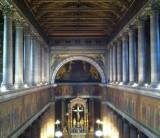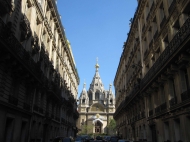Seen from Paris, blog about Paris
You thought Parisians are witty, arrogant, bitching about everything and anything, obsessed with food and culture, and always up for discussion? Well... you're perfectly right! And you're on the right page to check it out.

The problem with French Churches
As the state officially defends a strict line of secularism to protect each religion, the citizens are paying very heavy bills to maintain the thousands of running churches throughout the country.
Of course we will not discuss religion itself here, but a rather interesting and unfair contradiction that appeared in the long historical process of separation of church and state. Starting from the stranglehold of the Catholic Church for over a millennium on education, art, politics and science, wandering through the terrible priests slaughters of the Revolution and the expulsion of the monks from the convents to go to the secular situation we enjoy today, a lot of complex agreements had to be reached between the French State and the Catholic church. The Concordat of 1801 is one of them, the separation of church and state of December 9th, 1905, is another one.
In the process, one of the question was: Who must own the actual churches, and the art pieces they conceal? Since the Revolution, the churches were mostly confiscated by the State, and it was decided to stay on that basis. Nowadays, all the Cathedrals of France belong to the French State, and most of the other churches belong to the towns and cities where they are located. And as landlords, it is up to the State and the cities to maintain these old, expensive buildings.
The original plan wasn’t this, in 1905. Some « Religious Associations » were supposed to be created in order to pay for the bills with churchgoers money. However, not only the 1905 inventory pushed the country on the verge to civil war, but also Pope Pius X got very pissed, and so a weird status quo was found, where the building can be used by the Church, but is owned by the State or the City. This is written in the article 13 of the law of 1905 on Church and State. The problem is: in that case, the tenant does not pay the landlord…
And that raises two major issues: a financial one and a philosophical one.
The financial one is easy to spot: At a time when western states are desperately hunting for budget cuts, the millions spent each year in churches roofs, electric systems and other maintenance works could definitely be taken down. Of course, most of these churches are historical monuments, and the first reaction that pops to our mind is that we must keep them in shape. And that’s right. But that’s also true for Chateaux, Mansions or private museums, and the private owners of these monuments have to pay for the maintenance of their historical buildings. Why would the Church benefit from a different treatment? Especially that the State always funds a little bit of money to help in the case of Historical Monuments. But to leave the bill to the French Citizen is definitely abnormal, since the State only gets the costs to pay, but no profit to cash… And when you add that only 7% of Catholics declare going to church regularly, you can totally see the waste of State money…
The Philosophical one is less obvious, but much more dangerous. Among other goals, Secularism was implemented to guarantee freedom of religion, and freedom of politics. In a country that has a lot of different religions, like France, Secularism is the only answer. Because an atheist doesn’t want to pay for a synagogue or a Catholic for a mosque. And that’s fine. But in the case of Churches, everybody in France is paying for the religious building of the Catholic church, while Consistorial Synagogues only get 50% owned by the State, and while Muslims have to pray in the streets or rely on money coming from fundamentalist Islamic association instead of being allowed to build Mosques. And that is exactly what Secularism was suppose to prevent. This situation is not acceptable, as it clearly develops a national preference towards one of the religions of France. And égalité should be defended here!
It is now time for the State and the Vatican to work on a solution where the State can actually back out of anything related to the Church, and the Vatican can pay for all the buildings they use, or for both the State and the Vatican to negotiate that some of the Churches get another use, like it was done in the Netherlands or in the UK where they can be sold. Because it is obvious that the Vatican cannot maintain the thousands of churches they use in France -they can’t even put one priest per church-, and it is surely not the French citizen’s interest to pay for these very expensive bills without getting a return on investment.





